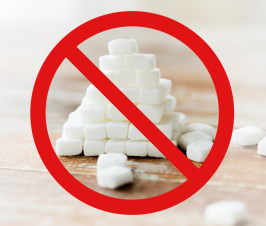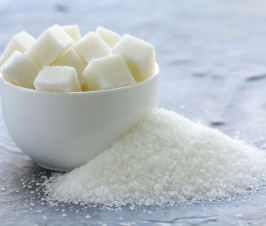Refined Crystalline Substance with Coarse Consequences
Whether or not it influences our individual food choices, there is a growing cultural understanding that sugar is an unhealthy part of the diet. We’re talking about the refined crystalline substance that comes in soda, cookies and other refined, packaged products. Not the natural sugar that comes in fruit, which interacts differently in the body because fruit also contains a lot of fiber and other elements which help to blunt the effects of the fructose on blood sugar levels. Refined sugar, as studies with mice has shown is as habit-forming as cocaine or nicotine. Yep, that’s right. In fact, mice will choose sugar over cocaine when given the choice, even after they are addicted to cocaine. The general explanation behind this is that there is a biological imperative to eat sugar in order to store fat for periods of food scarcity. This works incredibly well in a world where the sources of sugar are real foods, and food scarcity is a real threat. Its poses a huge problem when the sources of sugar are chemically synthesized, giving incredibly massive doses of sugar in an environment without any food scarcity. Because it’s always available, it’s incredibly difficult to deny this urge to eat it.
Should Sugar be Considered an Addictive Substance?
We know that sugar is correlated with obesity, type 2 diabetes, hypertension, and contributes to the development of fatty liver. But what’s less agreed upon is the nature in which sugar alters our mood, and whether or not it should be considered an addictive substance. There is a fair amount of disagreement as to whether sugar is addictive, but it certainly does appear that it fits the criteria in some areas.
Sugar Triggers Same Neurotransmitters as Commonly Abused Drugs
Sugar does seem to trigger the same neurotransmitters that are triggered by common drugs of abuse, including dopamine (the pleasure neurotransmitter). For this reason, it is generally accepted that there is a significant emotional component driving our relationship with sugar – it makes us feel good. For the same reasons why an addict or alcoholic might drink or use drugs during a stressful time in their lives, to escape, we use sugar to mask our emotions and give us a “sugar high.”
Withdrawal Symptoms Associated with Sugar
Sugar also poses certain withdrawal symptoms, such as nervousness, headaches, and fatigue when it is discontinued abruptly. These withdrawal symptoms are thought to come from a dopamine deficiency in the brain. This is generally a key indicator that a substance is habit-forming or addictive, since there is a major incentive not to stop using the substance, for fear of the negative feelings which come with the discontinuation – caffeine is similar in this way as well.
A final aspect of sugar addiction is that we know that it is negative to our health, we even plan to stop its use, but still find ourselves in the grip of its control, unable to say no to the cookie, the donut, the ice cream cone, etc. This is a classic behavioral characteristic associated with addictive substances.
Perspectives in Viewing Sugar as an Addictive Substance
There are important elements, or perspectives which come out of viewing sugar as an addictive substance, which we have learned from other substances of abuse. First, if I am an individual who has difficulty with the substance, sugar, that I get hooked and can’t say no even though it’s hurting me and causing health problems, no amount of the substance is going to be a good idea for me to ingest. The idea of moderation for a cocaine addict is insane. This is likely a necessary approach for many people who struggle with sugar addiction. And in all honesty, none of it is good for any of us.
Underlying Cause of Addiction
The second aspect of sugar addiction which we can thank decades of research in substance abuse for, is the underlying cause of addiction. Addiction is increasingly being acknowledged to have roots in trauma, emotional distress, and a difficulty processing through psychological obstacles presented by one’s past or present life situations. In short, addiction is often a method of self medicating because something in our lives is too difficult, painful, or confusing to confront – all these substances are incredibly good at helping numb the feelings that come along with trauma.
Source
- Dinicolantonio JJ, O’keefe JH, Wilson WL. Sugar addiction: is it real? A narrative review. Br J Sports Med. 2017.
Image Copyright: <a href=’https://www.123rf.com/profile_atic12′>atic12 / 123RF Stock Photo</a>
 Node Smith, ND, is a naturopathic physician in Portland, OR and associate editor for NDNR. He has been instrumental in maintaining a firm connection to the philosophy and heritage of naturopathic medicine among the next generation of docs. He helped found the first multi-generational experiential retreat, which brings elders, alumni, and students together for a weekend camp-out where naturopathic medicine and medical philosophy are experienced in nature. Four years ago he helped found the non-profit, Association for Naturopathic ReVitalization (ANR), for which he serves as the board chairman. ANR has a mission to inspire health practitioners to embody the naturopathic principles through experiential education. Node also has a firm belief that the next era of naturopathic medicine will see a resurgence of in-patient facilities which use fasting, earthing, hydrotherapy and homeopathy to bring people back from chronic diseases of modern living; he is involved in numerous conversations and projects to bring about this vision.
Node Smith, ND, is a naturopathic physician in Portland, OR and associate editor for NDNR. He has been instrumental in maintaining a firm connection to the philosophy and heritage of naturopathic medicine among the next generation of docs. He helped found the first multi-generational experiential retreat, which brings elders, alumni, and students together for a weekend camp-out where naturopathic medicine and medical philosophy are experienced in nature. Four years ago he helped found the non-profit, Association for Naturopathic ReVitalization (ANR), for which he serves as the board chairman. ANR has a mission to inspire health practitioners to embody the naturopathic principles through experiential education. Node also has a firm belief that the next era of naturopathic medicine will see a resurgence of in-patient facilities which use fasting, earthing, hydrotherapy and homeopathy to bring people back from chronic diseases of modern living; he is involved in numerous conversations and projects to bring about this vision.

















